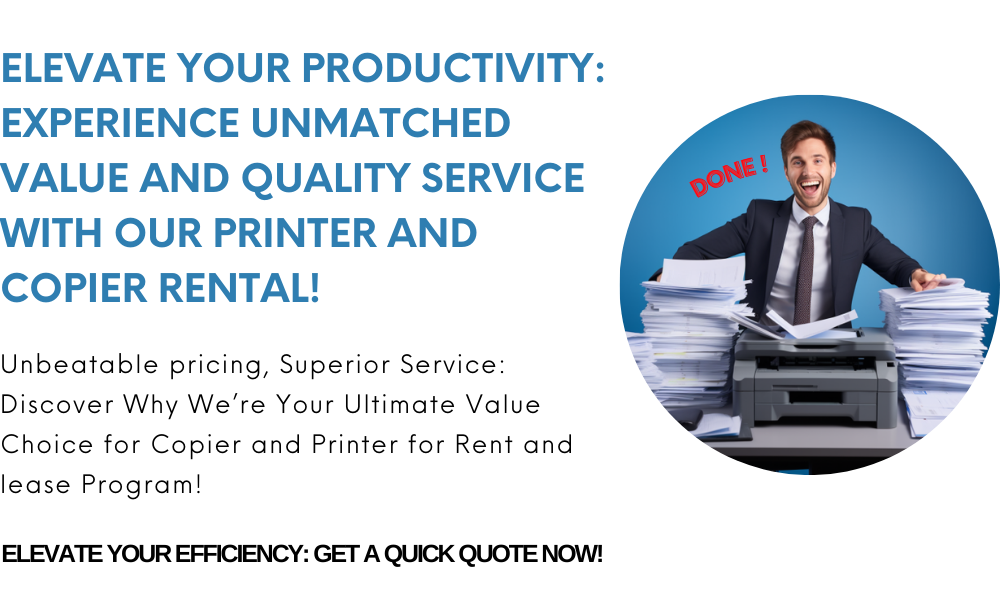
Avoiding Common Pitfalls in Copier Leasing

Avoiding Common Pitfalls in Copier Leasing
Part 1: Understanding the Challenges and Solutions in Copier Leasing
Introduction
Leasing a copier can be a smart decision for businesses, especially in the Philippines, where startups and SMEs thrive on cost-effective solutions. However, while copier leasing provides numerous benefits, such as reduced upfront costs and access to advanced technology, it’s not without its challenges. Entrepreneurs who rush into leasing agreements without fully understanding the terms or evaluating their needs often find themselves facing unexpected costs, operational inefficiencies, and long-term issues.
This blog highlights the common pitfalls in copier leasing and provides actionable advice for avoiding them. By understanding these challenges, businesses can make informed decisions, ensuring they maximize the benefits of leasing while minimizing risks.
Common Pitfalls in Copier Leasing
1. Overlooking Business Needs and Usage
One of the biggest mistakes businesses make is failing to assess their printing and copying requirements before leasing a copier. Without understanding your monthly volume, color needs, or additional features like scanning, you risk leasing equipment that doesn’t meet your needs or exceeds your budget.
Solution:
Conduct a thorough analysis of your business’s document management requirements. Consider:
- How many pages you print per month.
- Whether you need color or black-and-white printing.
- The importance of advanced features like duplex printing, mobile integration, or cloud access.
Choosing the right machine tailored to your needs can save money and improve efficiency.
2. Signing Contracts Without Reading the Fine Print
Leasing agreements often include detailed terms and conditions, and overlooking the fine print can lead to unexpected fees or obligations. Common issues include automatic renewal clauses, penalties for early termination, and unclear maintenance responsibilities.
Solution:
Take the time to carefully review the contract before signing. Pay attention to:
- Duration of the lease.
- Renewal terms and conditions.
- Maintenance and repair coverage.
- Additional fees for exceeding usage limits.
If you’re unsure about specific clauses, consult a legal or leasing expert to clarify terms.
3. Ignoring Total Cost of Ownership (TCO)
Many businesses focus solely on monthly lease payments without considering the total cost of ownership. Expenses like maintenance, toner, paper, and repair costs can add up, making the lease more expensive than anticipated.
Solution:
Request a detailed breakdown of all costs associated with the lease, including:
- Consumables like toner and paper.
- Maintenance and repair fees.
- Overuse charges for exceeding print limits.
Compare the TCO across different leasing providers to ensure you’re getting the best value.
4. Choosing the Wrong Leasing Provider
Not all leasing providers are created equal. Partnering with a provider that offers poor customer service, unreliable equipment, or unclear terms can lead to frustration and financial losses.
Solution:
Research providers thoroughly before making a decision. Look for:
- Positive customer reviews and testimonials.
- Transparent pricing and contract terms.
- Responsive customer support and technical assistance.
- A track record of working with businesses similar to yours.
5. Neglecting Maintenance and Servicing Terms
Maintenance is a critical aspect of copier leasing. Without clear maintenance terms, businesses may find themselves responsible for costly repairs or dealing with frequent downtime.
Solution:
Ensure your lease includes comprehensive maintenance coverage. This should include:
- Regular servicing and preventative maintenance.
- Quick response times for repairs.
- Access to replacement parts and consumables.
Discuss maintenance responsibilities with your provider to avoid misunderstandings.
Policies Tied to Copier Leasing
Understanding the policies associated with copier leasing is crucial for avoiding common pitfalls. These policies vary by provider but typically include:
1. Fair Usage Limits
Most leasing agreements include usage caps to prevent excessive wear and tear on equipment. Exceeding these limits often incurs additional fees.
Advice: Monitor your usage regularly to ensure you stay within the agreed limits. Consider negotiating higher limits if your printing needs are likely to increase.
2. Early Termination Penalties
Leasing contracts often include penalties for ending the lease before the agreed term. These penalties can be substantial, so it’s essential to assess your business’s long-term needs before committing.
Advice: If flexibility is important, negotiate a contract with shorter terms or early termination options.
3. Maintenance Responsibilities
Some providers include maintenance as part of the lease, while others expect businesses to handle it independently.
Advice: Confirm who is responsible for maintenance and what services are covered under the lease. Opt for providers that include maintenance to avoid unexpected expenses.
4. Equipment Return Policies
At the end of the lease term, businesses are typically required to return the equipment in good condition. Failure to do so may result in penalties.
Advice: Understand the return policies and keep the copier well-maintained throughout the lease.
Real-World Examples of Copier Leasing Pitfalls
Example 1: Ignoring Usage Caps
A small marketing agency in Quezon City leased a copier with a monthly limit of 5,000 pages. During a campaign, their usage spiked to 8,000 pages, resulting in overuse charges of ₱5,000 for a single month.
Lesson Learned: Monitor usage closely and negotiate higher limits if your business has seasonal spikes in demand.
Example 2: Poor Maintenance Terms
A startup in Cebu leased a copier from a provider that did not include maintenance in the contract. When the copier broke down, the startup was responsible for repair costs, totaling ₱15,000.
Lesson Learned: Always choose providers that include maintenance coverage in their leasing agreements.
Advice for Entrepreneurs Planning to Lease Copiers
Entrepreneurs can avoid common pitfalls by following these best practices:
1. Set Clear Objectives
Define your goals for leasing a copier. Are you looking for cost savings, access to advanced technology, or scalability? Understanding your objectives will help you choose the right provider and equipment.
2. Compare Multiple Providers
Don’t settle for the first provider you find. Request quotes from multiple providers and compare their terms, pricing, and services.
3. Plan for Future Growth
Ensure your leasing agreement can accommodate your business’s growth. Look for providers that offer flexible terms and the option to upgrade equipment.
4. Read Reviews and Seek Referrals
Learn from the experiences of other businesses by reading online reviews and seeking referrals from trusted contacts.
5. Regularly Review Lease Agreements
Periodically review your lease to ensure it still aligns with your business needs. Consider renegotiating terms if necessary.
FAQs
Q1: Is leasing a copier better than buying one?
Leasing is often more cost-effective for businesses that need access to advanced technology without the high upfront costs of ownership.
Q2: Can I negotiate lease terms?
Yes, most providers are open to negotiation, especially if you’re leasing multiple devices or signing a long-term agreement.
Q3: What should I prioritize in a leasing agreement?
Focus on clear maintenance terms, fair usage policies, and flexible contract durations.
Q4: Are there penalties for exceeding usage limits?
Most agreements include penalties for overuse. Monitor your printing volumes to avoid additional fees.
Q5: How do I choose the right provider?
Research providers based on their reputation, customer service, and transparency. Opt for companies with experience serving businesses similar to yours.

Avoiding Common Pitfalls in Copier Leasing
Part 2: Advanced Strategies for Navigating Copier Leasing in the Philippines
Introduction
In Part 1, we explored common challenges businesses face in copier leasing and how to address them. This second part focuses on advanced strategies for navigating the copier leasing process, from selecting the right equipment to negotiating flexible contracts. We’ll also discuss future trends in copier leasing in the Philippines, offering insights to help entrepreneurs make smarter decisions and avoid long-term pitfalls.
Advanced Strategies for Copier Leasing
1. Assessing the Total Cost of Ownership (TCO) Beyond the Lease Fee
While monthly lease fees are a major consideration, other hidden costs like maintenance, consumables, and penalties for overuse can significantly impact the total cost of ownership (TCO).
Solution:
Create a detailed cost analysis before committing to a lease. Consider the following:
- Monthly lease fee.
- Maintenance and service costs.
- Consumable costs (toner, paper).
- Penalties for exceeding usage caps.
Ask providers for an itemized cost breakdown to ensure you have a clear picture of all expenses.
2. Choosing the Right Copier Features for Your Business
Overpaying for unnecessary features or leasing equipment that doesn’t meet your needs are common pitfalls. It’s essential to align your copier’s capabilities with your operational requirements.
Tips for Choosing the Right Features:
- Multifunctionality: Combine printing, scanning, copying, and faxing in one device to save space and cost.
- Speed: High-speed copiers are crucial for businesses with high document volumes.
- Cloud Connectivity: Enables remote printing and document sharing, ideal for hybrid work environments.
- Security Features: Choose devices with encrypted printing and secure user authentication if you handle sensitive data.
Pro Tip: Consult with your team to identify must-have features before engaging with a provider.
3. Negotiating Flexible Lease Agreements
Copier leasing agreements can often be tailored to better meet your business’s needs. A rigid contract might lock you into terms that become less favorable as your business evolves.
What to Negotiate:
- Duration: Opt for shorter terms if you anticipate rapid business changes.
- Upgrade Options: Ensure the contract allows you to upgrade to newer models mid-term without penalties.
- Fair Usage Policies: Negotiate higher usage caps if your printing needs are likely to increase.
- Termination Clauses: Include provisions for early termination in case your needs change unexpectedly.
Providers are often willing to make adjustments to secure your business, so don’t hesitate to ask for customized terms.
4. Partnering with Reliable Providers
The success of your copier lease depends on the quality and reliability of the provider. Choosing the wrong partner can lead to frequent equipment issues, poor customer support, and hidden costs.
How to Choose a Reliable Provider:
- Research Reputation: Read online reviews, ask for referrals, and check for complaints.
- Evaluate Support Services: Look for providers with responsive customer service and fast repair turnaround times.
- Inspect Equipment Quality: Ensure the copiers are from reputable brands and in good condition.
- Ask About Maintenance: Providers that include regular maintenance in their lease agreements offer better value and fewer headaches.
5. Optimizing Usage to Avoid Overcharges
Exceeding usage limits or mismanaging equipment can lead to unnecessary expenses. By implementing best practices, businesses can stay within their lease terms while maximizing productivity.
Tips for Optimizing Usage:
- Set printing defaults to duplex (double-sided) to reduce paper waste.
- Limit color printing to essential documents.
- Train employees on proper copier use to minimize jams and errors.
- Monitor usage with built-in analytics tools to identify inefficiencies.
Trends Shaping Copier Leasing in the Philippines
The copier leasing industry in the Philippines is evolving to meet modern business demands. Here are some trends to watch:
1. Subscription-Based Leasing Models
Inspired by SaaS (Software as a Service) models, providers are introducing subscription-based plans that allow businesses to pay only for what they use. This approach offers greater flexibility and cost control, especially for startups and SMEs.
2. Eco-Friendly Leasing Options
With a growing focus on sustainability, providers are offering energy-efficient devices and consumable recycling programs. Businesses aligning with these initiatives not only save money but also enhance their environmental credentials.
3. Technology Integration
The integration of advanced technology, including AI-driven maintenance and cloud connectivity, is becoming standard. These features enable predictive maintenance, reduce downtime, and support hybrid work environments.
4. Short-Term Leasing for Projects
As businesses increasingly require flexibility, short-term leasing options are gaining popularity. These plans are ideal for events, temporary offices, or project-based work.
Avoiding Long-Term Pitfalls
To ensure your copier lease remains beneficial in the long run, consider these strategies:
1. Regularly Reassess Your Lease
Periodically review your leasing terms to ensure they still align with your business needs. If your operations have grown or your usage patterns have changed, renegotiate the agreement.
2. Monitor Equipment Performance
Keep track of your copier’s performance and maintenance history. Report recurring issues to your provider promptly to avoid prolonged downtime.
3. Stay Informed About Industry Changes
The copier leasing industry is dynamic. Stay updated on new technologies, pricing models, and regulations to ensure you’re always getting the best value.
Real-Life Success Stories
Example 1: A Retail Chain Adopts Subscription Leasing
A growing retail chain in the Philippines switched to a subscription-based leasing model. This allowed them to adjust copier usage during peak seasons, saving 15% annually on printing costs.
Example 2: A Startup Benefits from AI-Powered Maintenance
A Cebu-based tech startup leased an AI-driven copier. The predictive maintenance feature reduced downtime by 40%, enabling the team to meet tight project deadlines without interruptions.
FAQs
Q1: How can I ensure my lease is scalable for business growth?
Opt for providers that offer flexible terms, including mid-contract upgrades and adjustable usage caps.
Q2: What are the most important features for SMEs to prioritize?
Multifunctionality, cloud connectivity, and cost-efficient printing are essential features for SMEs.
Q3: Are there any risks to short-term leasing?
Short-term leasing may come with higher monthly fees. Evaluate your usage needs carefully to determine if it’s cost-effective.
Q4: How do I handle disputes with my provider?
Address disputes promptly by referring to the terms outlined in your contract. Document all communications for reference.
Q5: What should I do if my copier frequently breaks down?
Contact your provider immediately. If the issue persists, request a replacement or renegotiate the lease.
Q6: How do I minimize environmental impact while leasing a copier?
Choose energy-efficient models, implement paper-saving policies, and partner with providers offering consumable recycling programs.
Q7: Can I extend my lease if I’m satisfied with the service?
Most providers allow extensions or renewals. Negotiate terms that reflect your satisfaction and any new business needs.
Q8: What should I look for in a leasing provider’s customer support services?
Ensure the provider offers prompt response times, 24/7 support availability, and transparent communication. Providers with a strong reputation for customer service are more likely to address issues quickly and effectively.
Q9: Can I lease multiple copiers for different office locations under one agreement?
Yes, many providers offer multi-location leasing options under a single contract. Discuss your needs with the provider to negotiate a centralized agreement that covers all offices.
Q10: Are there tax benefits to leasing a copier instead of purchasing one?
Leasing payments are often classified as operational expenses, which can be deducted from taxable income. Consult with a tax advisor to understand how copier leasing can benefit your business financially.
Conclusion
Copier leasing offers a cost-effective and flexible solution for businesses in the Philippines, but avoiding common pitfalls is key to maximizing its benefits. By carefully assessing your needs, choosing a reliable provider, and staying informed about industry trends, you can ensure your lease supports long-term productivity and growth.
Whether you’re a startup, SME, or established enterprise, these strategies will help you navigate the copier leasing process with confidence and clarity.
Start Renting Today
Printer rentals provide a practical, flexible, and budget-friendly solution for businesses of all sizes. Whether you’re comparing printer rentals vs. purchasing, searching for eco-friendly options, or exploring solutions for high-performance printers, we have the right plan for you.
For more answers to common questions, visit our printer rental FAQs. Explore our customizable printer rental contracts and find the perfect fit for your business needs today. Let us help you enhance efficiency and flexibility with a rental plan designed for success.
To learn more about printer rentals and how Marga Enterprises can support your green initiatives, contact us today at 09171642540 or 09614481276. You can also reach us via email at marga.enterprises2013@gmail.com. Let’s work together to build a greener, more sustainable future for generations to come. Visit Marga Enterprises and find out why we are the No. 1 Copier & Printer Rental Provider in the Philippines.
Join our growing community on Facebook and Youtube for exclusive content and discussions designed to propel your business forward. Stay updated on our posts and be part of the conversation!